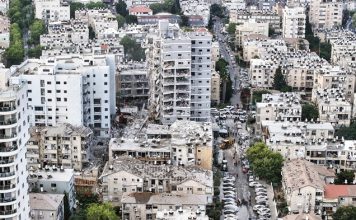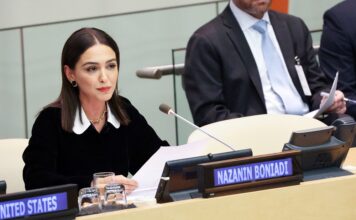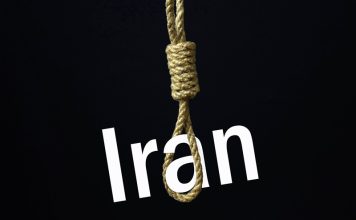By Kayhan Life Staff
A number of U.S.-based Iranians and social media users have criticized the award-winning Iranian actor Parviz Parastui for his public silence about Iran’s violent suppression of a wave of nationwide demonstrations in November 2019 and his alleged support for the late Lieutenant-General Ghasem Soleimani, the former commander of the Islamic Revolutionary Guards Corps Qods Force (IRGC-QF), who died in a U.S. drone attack in January 2020.
In November 2019, protests broke out in Iran against the government’s massive fuel price hike. The protests quickly turned into a violent nationwide movement against the Islamic Republic, resulting in many deaths, injuries, and arrests. Reuters put the death toll at 1,500.
Parastui was in Los Angeles last week for the screening of his film “Afsaneh Banasan; Dastanhay-e Hezar Va Yek Rouz” (“Genie of the Magic Lamp; One Thousand and One Days Stories”), a joint Iranian-Japanese production written by Zeinab and Habib Ahmadzadeh and directed by Mr. Ahmadzadeh. Habib Ahmadzadeh is a well-known figure in a category of Iranian literature dealing with the Iran-Iraq War (1980-88).
[aesop_image img=”https://kayhanlife.com/wp-content/uploads/2022/05/WhatsApp-Image-2022-05-09-at-11.26.22-PM.jpeg” panorama=”off” credit=”Parviz Parastui hitting Sam Rajabbi and knocking his mobile phone out of his hand. KL./” align=”center” lightbox=”on” captionsrc=”custom” captionposition=”left” revealfx=”off” overlay_revealfx=”off”]
“I had a face-to-face conversation with Parviz Parastui, asking him about his relationship with Ghasem Soleimani,” Sam Rajabi, an Iranian human rights activist living in the U.S., tweeted on April 30. “He responded by hitting my wrist very hard and knocking my mobile phone out of my hand.”
The tweet included footage of Parastui speaking to Mr. Rajabi.
Gabriel Noronha, a former U.S. State Department Special Advisor for Iran, tweeted: “Yesterday, I asked why the State Department gave a visa to Parviz Parastui — one of Ghasem Soleimani’s close supporters and apologist for Iranian terrorism.”
“Last night, he assaulted an Iranian-American human rights activist in Los Angeles while attending a CodePink event,” Mr. Noronha added.
Yesterday I asked why the @StateDept gave a visa to Parviz Parastui – one of Qassem Soleimani's close supporters and an apologist for Iranian terrorism.
Last night he assaulted an Iranian-American human rights activist in Los Angeles while attending a CodePink event. pic.twitter.com/5vOVScRmN3
— Gabriel Noronha (@GLNoronha) April 30, 2022
The tweet included a segment of the clip posted by Sam Rajabi with an English subtitle. In it, Rajabi, who is holding the mobile phone, asks Parastui: “I would like to know what your relationship with Ghasem Soleimani was?”
“It is none of your business,” Parastui responds.
Rajabi, who says he recorded the confrontation with his mobile phone, asks: “Why is it none of my business? It is the question of 80 million Iranians.”
Parastui replies: “Because you do not speak like a human.”
Rajabi follows with another question: “How do I not speak like a human? I am asking calmly.”
Parastui responds: “Listen, listen, listen to me.”
The clip ends with Parastui allegedly knocking the phone out of Rajabi’s hand.
Sam Rajabi, a world Jiu-Jitsu champion, said he was injured when Parastui knocked the mobile phone out of his hand. As a result, he received medical and psychological checkups at a hospital.
Los Angeles police are reportedly investigating the incident.
In a video posted on his Instagram page, Parviz Parastui alleged that several people were holding “their flags,” “shouting profanities” and blocking the entrance to the movie theater.”
By “their flags,” Parastui meant the pre-revolutionary Iranian flag with the sun and lion motif.
In the undated clip, Parviz Parastui is seen sitting against a yellow and blue background, suggesting the colors of the Ukrainian flag. He does not address the public’s outrage at his treatment of Sam Rajabi. He complains about criticisms leveled against him.
“We have been here for nearly two weeks for the screening of Dr. Habib Ahmadzadeh’s film, ‘Genie of the Magic Lamp; One Thousand and One Days Stories,’” Parastui explained. “The film is about peace and nothing else. It is a documentary. It depicts humanitarian efforts in the past decade. We have brought this film to America on an invitation from CodePink.”
“Incidents that should have never happened took place in two settings,” Parastui noted. “Five or six people holding their flags and shouting profanities full of expletives. There were families there. I even asked them to lower their voices so we could sit down and talk. We are patient enough to sit for discussions.”
“I am on a peace mission here,” Parastui added.
CodePink describes itself as a “women-led grassroots organization working to end U.S. wars and militarism, support peace and human rights initiatives.”
Several famous Iranian artists attended the “Genie of the Magic Lamp; One Thousand and One Days Stories” screening in LA, including actress Gohar Kheirandish and film producer-director Asadollah “Essy” Niknejad, pop singer Shahbal Shabpareh, and music composer Esfandiar Monfaredzadeh.
Some of those attending the film’s premiere said that such events should not be politicized.
“We must learn to respect other people’s viewpoints,” Gohar Kheirandish reportedly said.
Footage posted on social media apparently showed Esfandiar Monfaredzadeh confronting a critic of the Islamic Republic, who reportedly lambasted Monfaredzadeh for attending the film’s premiere.
Many people have taken to social media, accusing Parviz Parastui and other artists of “playing the middle.”
Using the hashtag #Parviz_Prastui, social media users have urged famous figures in Iran’s creative community “not to sit on the fence any longer.” They have called on artists to stop making money from their work while ignoring the plight of the Iranian people.
While many on social media have defended Sam Rajabi’s right to ask Parviz Parastui about his silence over the violent suppression of November 2019 protests and his support of General Ghasem Soleimani, Iranian state media and others affiliated with the Islamic Republic have praised Parastui and others for defending themselves against “anti-revolution” elements.
In recent years, there have been similar instances involving artists.
During a news conference at the 2021 Cannes Film Festival, Oscar-winning Iranian film director Asghar Farhadi was asked about two actors, Amir Jadidi and Mohsen Tanabandeh, in his film “A Hero,” who had reportedly taken part in productions funded by the Iranian Intelligence Ministry and the Islamic Revolutionary Guards Corps (IRGC).
Footage of the press conference, which was included in a tweet by Kayhan London, showed Farhadi replying: “I see actors as actors. An actor does their best to play a role in a film. I have not seen the films you mentioned. When I make a film, I look for an actor who will be the best to play that role. I do not look at the person’s passport or how they view life. I let them help me with my film. They are also free to live their lives and have their views outside of their collaborative work with me.”







